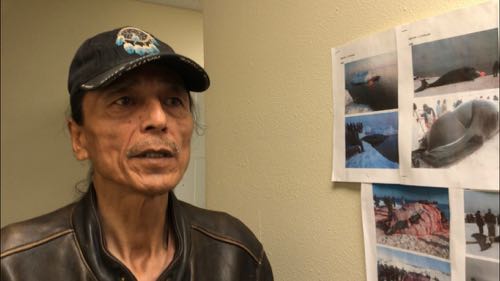Talk of the Town
 Tribal Leader Delbert Pangawi talks about Mother Earth's renewal and community whaling traditions.
Tribal Leader Delbert Pangawi talks about Mother Earth's renewal and community whaling traditions.
"There was no sea ice this year" or "we only had two weeks of sea ice" is how most first conversations with locals have begun since I've been here. It's inconceivable how important this is unless you live in a subsistence community. So much of life's rhythms here rely on the ebb and flow of the sea ice, which normally lasts at least 4-5 months.
Snow is still on the cliffs and in the mountains, even in this last week of July, and that in itself is notable. "We had a lot of snow this year, but no ice", is the common lament. With so much open water, the mist that rises from it adds humidity, likely causing more snow accumulation. Ice simply isn't behaving and critical decisions about hunting and life depend upon it. You get the sense in conversation that ice is alive, a living being in the minds of the locals, although there's never blame as much as a sense of resignation to change.
Elders here say the temperature and weather fluctuations are cyclical, part and parcel of nature, while younger villagers wonder about global warming. No one truly understands, and speculation is constant.
The Tribal Leader, Delbert Pangawi, (I'm not sure how to spell his Yupik name, but it's the same way the drummers begin some of their singing!), recounted a story about his grandfather forseeing these changes back in the early 1980's. According to him, Mother Earth, a living, breathing being, ages just like us humans, but of course on a millennial scale. Every so often, she "needs to renew, reorganize, and turn herself 'inside out' then start over again like a newborn baby." His grandfather anticipated the changes that go along with this renewal, and that is what Delbert says we are witnessing with the climatic changes, disruptive and destructive weather events, and fluctuations in temperatures, sea levels, ice, flora and fauna existences.
With this need to renew, however, comes winter. Not the seasonal kind, but a "long dark winter" akin to another Ice Age. There is also an accompanying belief that we cannot slow down or stop Mother Nature during this necessary renewal cycle.
I asked if that belief relieves us and younger generations of having to "do" anything to stop the changes or even to mitigate them, and he said there's "always a way to believe", but he didn't clarify further. Speaking to others who were born here in Savoonga decades ago, one gets the sense of urgency in learning to retain traditional knowledge, and passing it along to the kids because it might get them back into taking care of Mother Nature's gifts. Pangawi talked about "reverence" for all the creatures and living beings on Earth, and how we are supposed to be the caretakers, but we are favoring our power of destruction over our power to protect.
"Getting kids into the land, out on the island in new places that they're not used to, camping... we need to do more of that. Elders used to take care of that, but now it's left up to the school," says Larry, one of the community's drummers who works with kids. "And that doesn't really work. Not here. Not with our subsistence traditions."


Add new comment